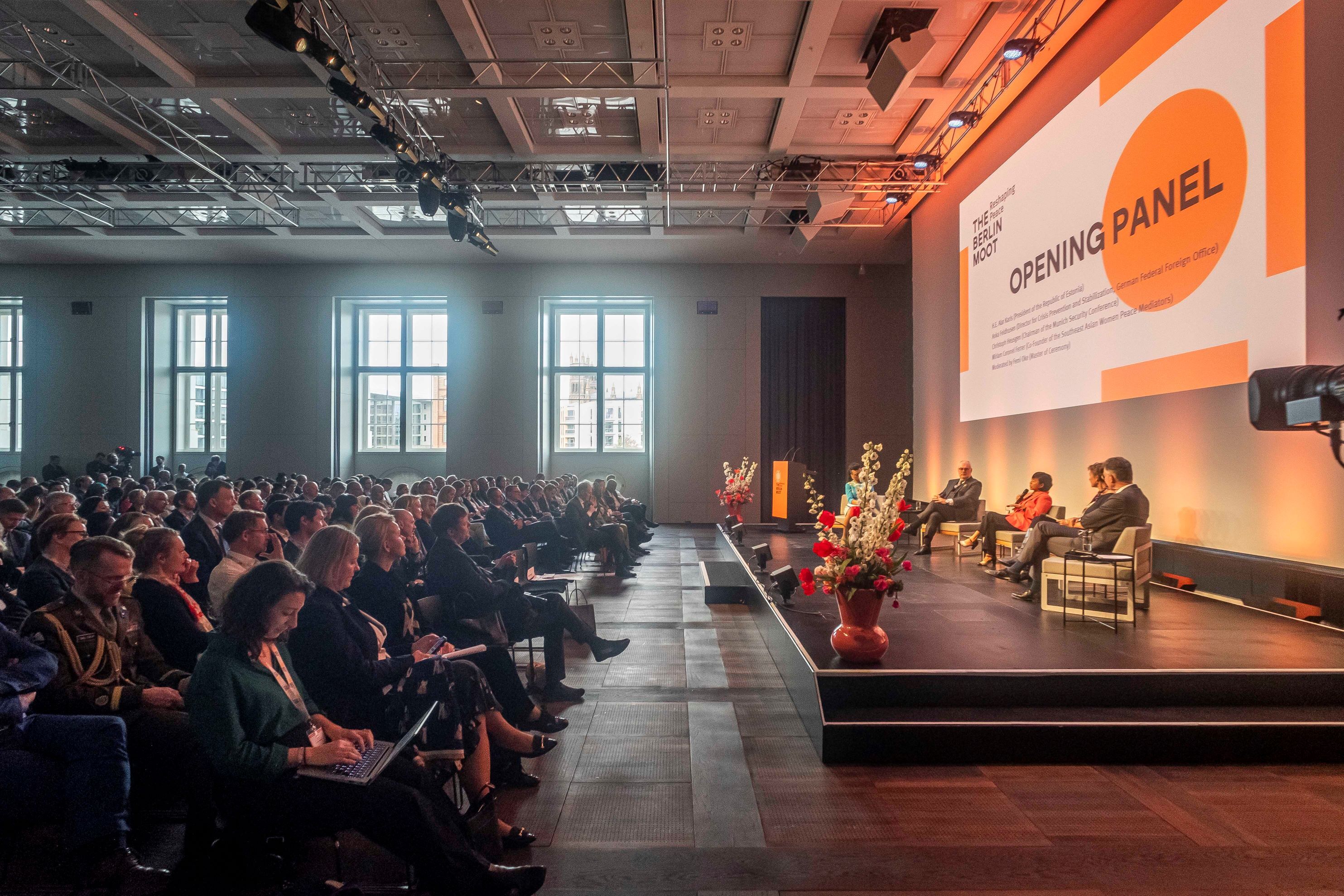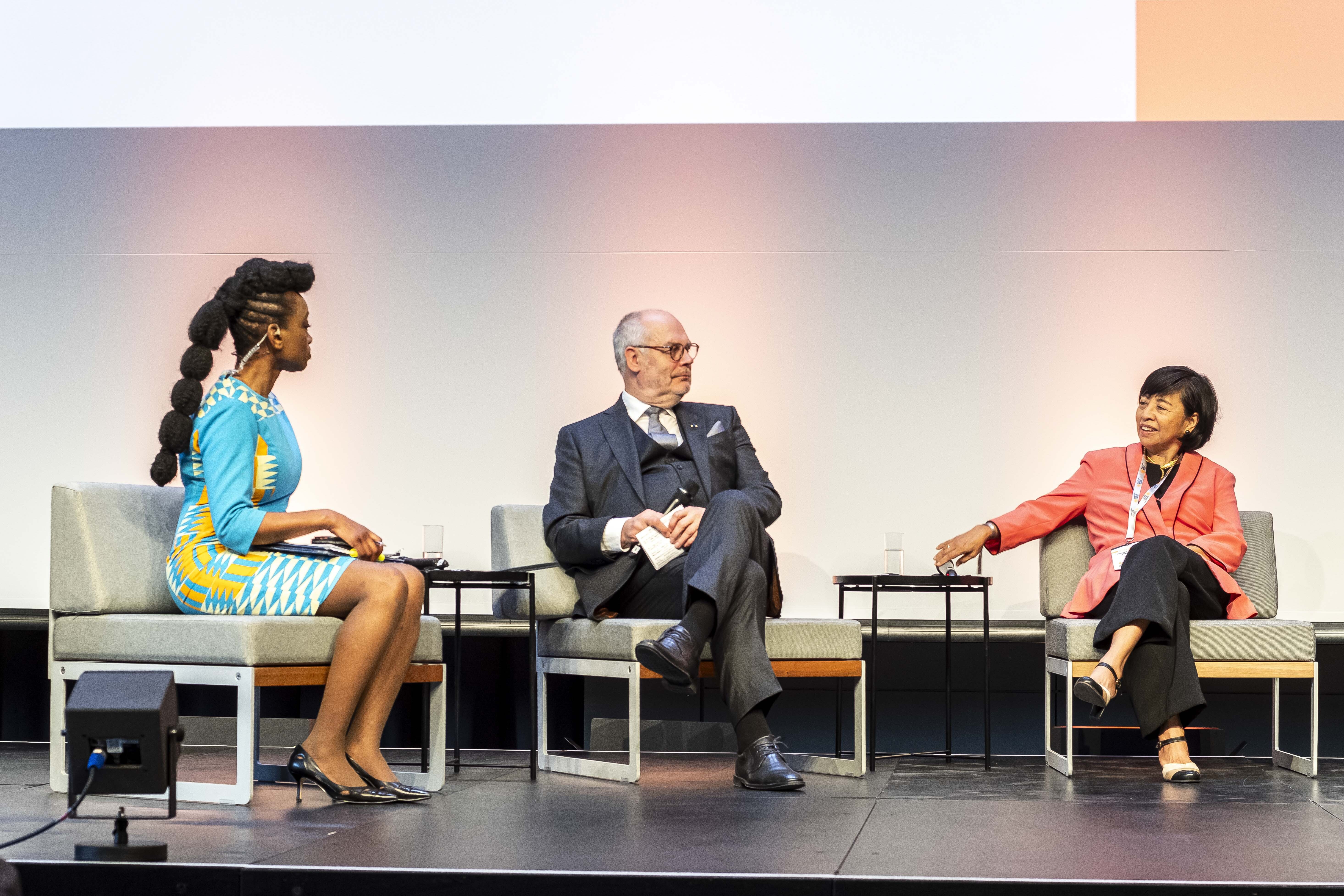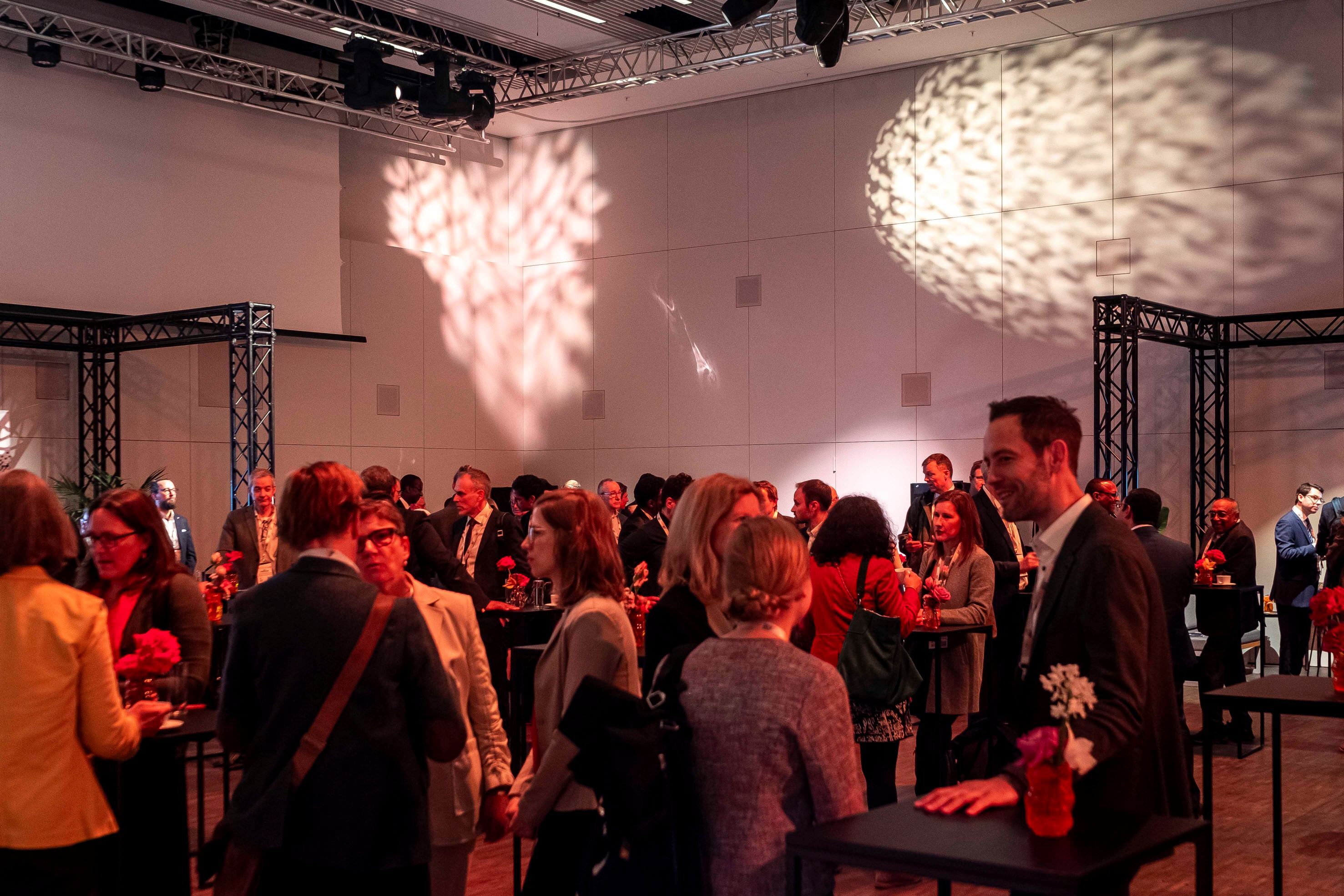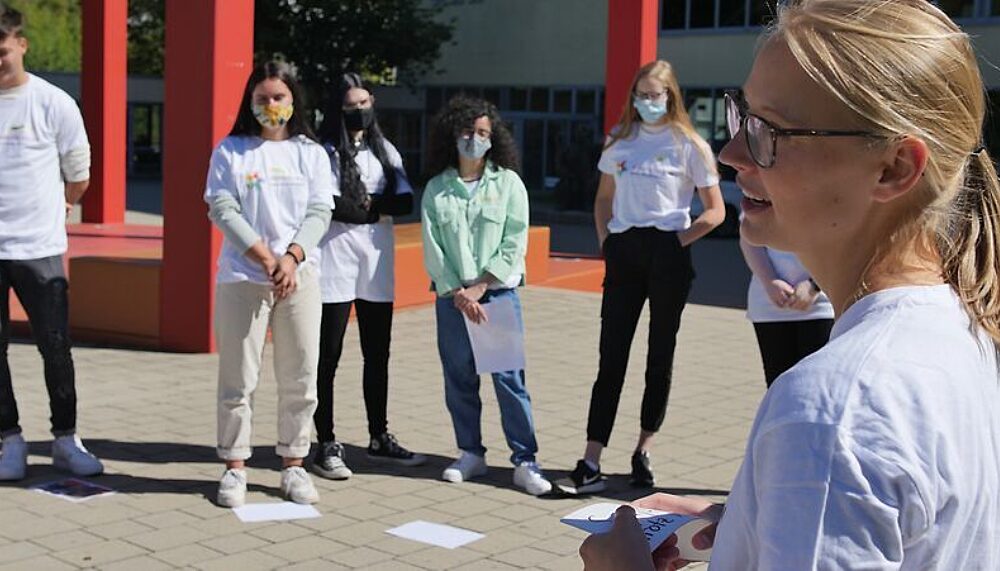FEATURE | 17 Apr 2024
Day one of The Berlin Moot: High time to reshape peacemaking
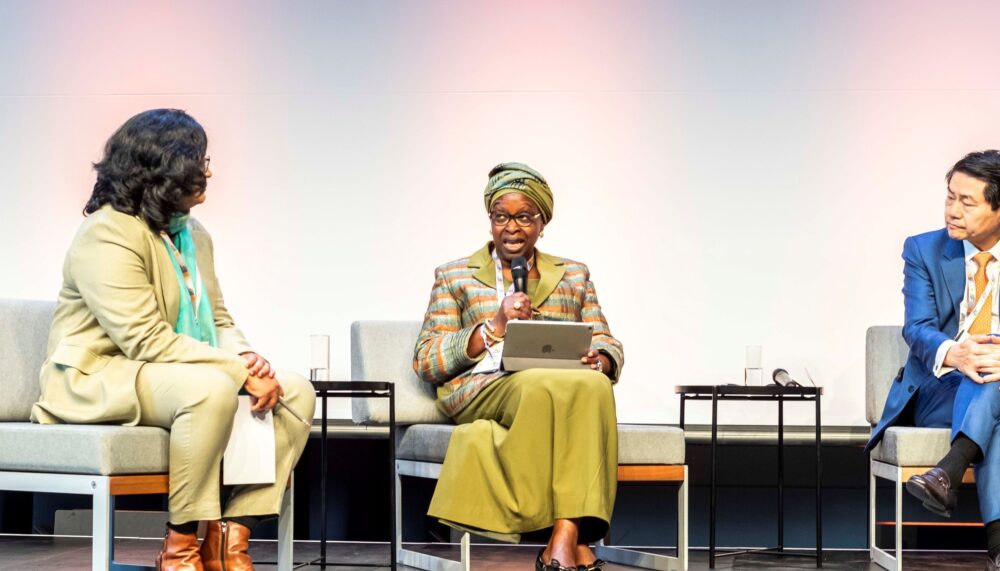
Read a summary of takeaways from the first day of The Berlin Moot
First day of inaugural peace conference brings together around 300 international experts and diplomats at Humboldt Forum to reshape peacemaking
Top of the agenda: How peacemaking can respond to global challenges such as climate change and escalating conflicts in many regions of the world
The Estonian President Alar Karis stresses the importance of thinking peace and security together: “Every conflict and war is different. All of us have to do something, first of all to stop a war, but then to think of what is next.”
Mediators call for meaningful inclusion of peace actors from all sectors of society, as well as female voices
“Today there are more conflicts than at any time since 1945, some of them escalating very dangerously, and some of them with horrific levels of civilian casualties, most notably Gaza.” With these words, the Berghof Foundation’s Executive Director Andrew Gilmour kicked off day one of The Berlin Moot at the Humboldt Forum. Supported by the German Federal Foreign Office and notable foundations, the conference brings together policymakers, practitioners, and experts from various sectors to develop innovative approaches to peacemaking.
The Berlin Moot, a conference pioneering new approaches to peace
From 17- 18 April 2024, we bring together experienced peacebuilders and mediators, as well as experts and scientists from various disciplines to develop urgently needed methods and tools to address the current complexity of war and conflict.
The inaugural edition of The Berlin Moot is supported by the German Federal Foreign Office, as well as Robert Bosch Foundation, Stiftung Mercator, Gerda Henkel Foundation, Lotto Stiftung and BMW Foundation Herbert Quandt.
A lack of trust in the United Nations as a peacemaking actor, the double standards in applying international law, as well as the scarcity of resources available for peace initiatives have had massive implications on peacemaking as a foreign policy instrument.
In the opening panel, Alar Karis, President of the Republic of Estonia, Anka Feldhusen, Director for Civilian Crisis Prevention and Stabilisation at the German Federal Foreign Office, Christoph Heusgen, Chairman of the Munich Security Conference, and Miriam Coronel Ferrer, Co-Founder of the Southeast Asian Women Peace Mediators, discussed strategies to better address these challenges. Feldhusen highlighted that “peace is such an elusive thing, so difficult to reach. We need to get out of our respective silos – and work together.” Coronel Ferrer added: “If you want peace, you prepare for peace. [...] Let us not put all our eggs in the basket of deterrence.”
Takeaways from the morning:
The need to listen to and support local actors
President Karis called for upholding UN Charter Article 27 which demands “a party to a dispute shall abstain from voting in the UNSC”
Heusgen asked for reform of the UN Security Council so that it better represents the current world order
Adapting methods in peacemaking
In the last decades, the declared objective of peace processes was to transform societies: address the root causes of conflict, and enhance inclusion and participation. In recent years, this method of making peace has been challenged by a newly established multipolar world order. Against this background, our panel on multipolarity, geopolitics and norms in peacemaking focused on fostering mutual understanding, enhancing cooperation, and ensuring inclusive dialogue between global powers. Günther Baechler, Ambassador (RTD) Swiss Ministry of Foreign Affairs, highlighted that “we should be clear about our norms. We should be clear about our messages.” Bineta Diop, Special Envoy of the Chairperson of the African Union Commission on Women, Peace and Security, shared her hope to “come back to Berlin and review the implementation of [The Berlin Moot’s] recommendations and see how far they have been implemented. We need action not only talking.”
Takeaways:
Strengthen trust between large global players, including China, and enhance cooperation while being explicit on contested issues
Rather than focus on policy formulation, focus more on improving the implementation of policies within regional and multilateral organisations
Peacemakers and governments need to develop a coherent approach that sticks to principles, and apply them to avoid double standards
Ensure mutual respect towards alternative development and peacemaking models
PeaceLabs throughout the day brought together experts from diverse fields to contribute to the advancement of peacemaking tools. One session focused on how insights from neuroscience can help us better understand what happens to the brain in stressful situations. In our PeaceLab on the brain and peace, we disrupted the notion of ‘rational actors’ to unpack how emotions and identity influence high-level peace processes. The discussion focused on the flexible nature of identity and how certain facets can be leveraged for constructive dialogues and outcomes – as was the case with women members of the Colombian government and FARC.
Takeaways centred on the need to rehumanise conflict parties, including:
Allowing for grievances and vulnerability to be shared
Acknowledging how facets of identity can and should be drawn on for constructive dialogue
Creating shared spaces outside of formal negotiations to foster connection between conflict parties
A further PeaceLab focused on the link between climate change and peacemaking. As climate-related challenges escalate, developing countries often bear the brunt of the climate crisis, exacerbating existing vulnerabilities and increasing the risk of conflict. Against this background, the PeaceLab “planet and peace” identified ways to make peace processes more climate-informed while also considering the risks and limitations of such approaches. Aligning incentive structures across governance levels with a shared vision for a green and peaceful future can create opportunities for localised solutions.
Takeaways:
Climate-informed peace processes must include justice and accountability measures
To deal with the many layers to climate politics, we need to start by working with grassroots actors
We need to bring climate into youth education
A requisite for working in climate vulnerable contexts is buy in from all relevant stakeholders and sufficient resources
Inclusivity in peacemaking
A new approach to peacemaking would need to ensure that all relevant actors are involved. Protest movements have been hugely influential in driving peace efforts around the world. However, high-level actors are often unsure how to engage them in peace efforts. In our panel on protest and peace, we explored the roles and contributions of youth-led peaceful protest movements for peacemaking and nonviolent transitions, the risks of excluding them in decision-making arenas, and the challenges faced by external actors in engaging with mass movements.
“A protest is a sign or an action of disapproval or objection. I think it's always important to identify and understand the reasons behind a protest - they always come from somewhere”, said Kees Matthijssen, former force commander in the United Nations Multidimensional Integrated Stabilisation Mission in Mali. The discussions highlighted the importance of incorporating civilian voices and perspectives into high-level peace negotiations to achieve outcomes that work and last. Shaheen AlSharif from Youth in Action noted that the Sudanese, for instance, want concrete processes and commitments in place. Abdallah Hamdok, former Prime Minister of Sudan, reflected: “We need to provide an opportunity for sharing of experiences from elsewhere, which might have succeeded.”
Takeaways:
Engage in dialogue with conflict actors even if they have a different opinion
Youth activists are powerful drivers of change and need to be part of the solution
Peace processes must be inclusive to achieve sustainable peace
Annette Weber, EU Special Representative to the Horn of Africa, called on the international community to overcome competition and get more serious on coordination.
Finally, women also play a pivotal role in peacemaking. “We are the movers and shakers of peacebuilding in our communities”, emphasised Esther Njomo Omam, Executive Director of Reach Out Cameroon at our last panel of the day. Neha Sanghrajka, Senior Advisor on Mediation at the United Nations, highlighted the need for a paradigm shift towards more inclusive and collaborative peace leadership. The discussions underscored the importance of valuing women's inclusion beyond their expertise in “gender” and of constantly challenging outdated patriarchal structures. “The barriers against women need constant work”, as Hilde Frafjord Johnson, former Norwegian Minister of International Development, put it. Itonde Kakoma, President of Interpeace, added in regards to peace leadership: “We are not talking about quick wins. We're talking about possibly decades”.
Takeaways:
Enhance meaningful representation of women in peace negotiations and decision-making processes.
Support initiatives that empower women mediators and peacebuilders.
Mediation support actors should lead by example: they must have women in leadership positions
Sanghrajka argued for the importance of allowing failure: “When you know you are allowed to fail, you feel more comfortable to take risks. And when you take more risks, there can be more success.”
As the first day of The Berlin Moot draws to an end, dialogues and workshops with a new and diverse range of actors and expertise call for a reshaping of peacemaking in the 21st century.
With an ongoing focus on interdisciplinary collaboration, innovative methodologies, and inclusive participation, day two of the conference will ask what technologies can best be leveraged to enhance the sustainability and implementation of peacemaking agreements, how we can make peace processes more effective, and what we can learn from the past as we look to the future.
More tomorrow.
Watch the livestream of the day here.
The Berlin Moot in the media
"Traditional ways of restoring peace no longer really work, at the Berlin Moot we are looking for improvements." says Executive Director of the Berghof Foundation Andrew Gilmour. (Tagesschau)
Senegalese peace activist Bineta Diop demands “Africa needs a permanent seat on the Security Council.” (Frankfurter Rundschau)
Andrew Gilmour: “The alienation between the West and the global South is a cause for concern for me.”(Tagesspiegel)
Oliver Wils, Head of Berghof’s MENA department: “The current escalation of conflicts is a danger to the global order and for civil society. At the Berlin Moot we discuss smart, intelligent and innovative cooperation.” (Deutschlandfunk Kultur)
Follow us on X, Instagram and LinkedIn for more impressions of the day. Use the hashtag #TheBerlinMoot to join the conversation.
Media contact
You can reach the press team at:
+49 (0) 177 7052758
email hidden; JavaScript is required
